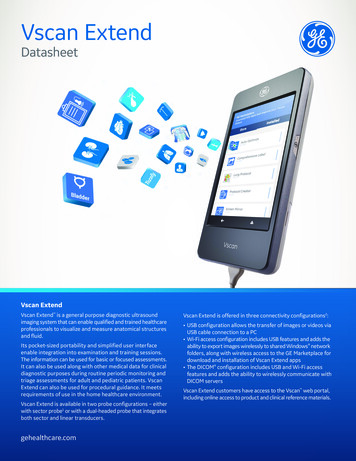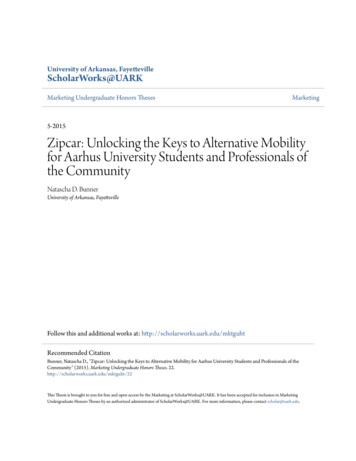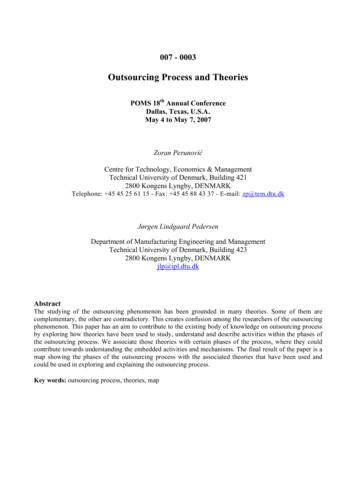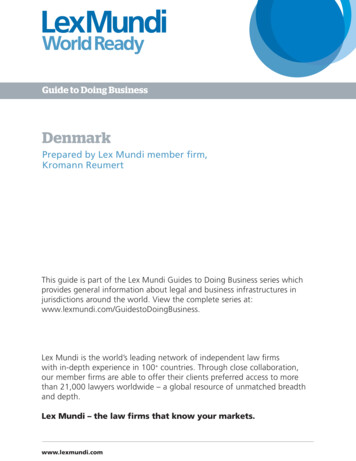
Transcription
Guide to Doing BusinessDenmarkPrepared by Lex Mundi member firm,Kromann ReumertThis guide is part of the Lex Mundi Guides to Doing Business series whichprovides general information about legal and business infrastructures injurisdictions around the world. View the complete series at:www.lexmundi.com/GuidestoDoingBusiness.Lex Mundi is the world’s leading network of independent law firmswith in-depth experience in 100 countries. Through close collaboration,our member firms are able to offer their clients preferred access to morethan 21,000 lawyers worldwide – a global resource of unmatched breadthand depth.Lex Mundi – the law firms that know your markets.www.lexmundi.com
No. 5 - 2017DOING BUSINESSIN DENMARK1DOING BUSINESS IN DENMARK
TABLE OFCONTENTSDOING BUSINESS IN DENMARK
KROMANN REUMERT4
1.INVESTMENT CLIMATE AND OPPORTUNITIES. 182.COMPANY LAW . 222.1Introduction. 222.2Incorporating a company. 222.3The Danish Companies Act. 232.4Public and private limited companies. 232.5Branch office. 412.6European Company (“SE”). 412.7European Cooperative Society (“SCE”). 412.8Limited partnership (“Kommanditselskab”, abbreviated “K/S”). 422.9 Limited partnership company (“kommanditaktieselskab” or“partnerselskab”, the latter abbreviated “P/S”). 422.10Partnership (“interessentskab”, abbreviated “I/S”). 432.11Entrepreneur Company (”Iværksætterselskab”, abbreviated ”IVS”). 432.12European Economic Interest Groupings (“EEIG”). 442.13Representation office. 443.ACCOUNTING. 494.MERGERS & ACQUISITIONS. 534.1Introduction. 534.2Acquisition of shares. 534.3Mergers. 554.4Companies with shares listed on a regulated market. 564.5Acquisition of assets. 585.TAX 636.THE FINANCIAL SECTOR. 676.1Introduction. 676.2Securities admitted to trading on a regulated market. 676.3Investment companies. 716.4Investment adviser. 736.5Banking. 736.6Insurance companies. 746.7Mortgage credit institutions. 756.8Funds. 766.9Interests in Danish financial institutions. 787.AGENTS AND DISTRIBUTORS. 827.1Agents. 827.2Distributors. 838.FOREIGN EXCHANGE REGULATIONS. 875DOING BUSINESS IN DENMARK
411.512.12.112.212.312.412.512.612.712.812.9REAL PROPERTY AND CONSTRUCTION. 91Introduction. 91Purchase of real property. 91Buildings, fixtures and fittings. 93Leases. 93Commercial leases. 93Land leases/ground rent. 95Construction. 95ENVIRONMENTAL LAW. 101Introduction. 101Neighbour law. 102Green taxes . 102Planning. 102Environmental protection. 103Waste. 105Soil contamination. 105Environmental liability. 107Genetic engineering. 107Chemical substances. 108Water resources. 108Protection of marine environment. 108Nature protection. 109COMPETITION LAW. 113Introduction. 113Bilateral and multilateral arrangements. 113Abuse of a dominant position. 116Damages for infringements of the competition law. 116Merger control. 117INTELLECTUAL PROPERTY. 123Introduction. 123Patents. 123Utility models. 124Trademarks and service marks. 124Copyright. 125Designs. 126Know-how. 126Passing off. 126Employees’ inventions etc. 127KROMANN REUMERT6
6.3Enforcement of intellectual property rights. 128COMMERCIAL LAW. 133Introduction. 133Standard terms and conditions. 133Limitation and exclusion of liability. 133Default interest. 134Sale of goods. 134The UN Convention on Contracts for the InternationalSale of Goods (CISG). 134Credit agreements. 135Jurisdiction rules. 135Governing law. 136Recognition and enforcement of judgments and arbitral awards. 137Marketing practices. 138Data protection. 139PERSONNEL AND LABOUR MARKET. 143Introduction. 143Notice periods. 144Unfair dismissals. 146Large-scale redundancies. 147Salaries and wages. 147Working hours. 148Holiday. 148Restrictive covenants. 149Employees’ inventions etc. 151Equal pay. 152Working environment regulations. 152Accidents at work. 152Executives. 152Working permits and visa requirements. 153SHARE BASED REMUNERATION. 159Introduction. 159Employment law. 166Other areas of Danish law. 167LAW OF TORTS AND INSURANCE. 171Introduction. 171Law of torts. 171The culpa rule. 1717DOING BUSINESS IN DENMARK
9-2 of the Danish Code (1683) – employer’s liability. 172Quantification of amount of damages. 172Causation and foreseeability. 173Relaxation of liability. 173Product liability. 173Law of insurance. 174Provision of services - establishing an insurance company. 175LEGAL SYSTEM. 179INSOLVENCY. 185Introduction. 185Restructuring. 185Bankruptcy. 189KROMANN REUMERT8
9DOING BUSINESS IN DENMARK
INTRODUCTIONDOING BUSINESS IN DENMARK
KROMANN REUMERT12
1.INTRODUCTIONDoing Business in Denmark is intended as a guide for foreign investors. Its focus is tointroduce some of the most important regulation and practical issues to be consideredbefore committing to a more detailed examination of Denmark as an investment destination.This guide concentrates on in-bound investments, mergers & acquisitions, and variousissues which should be considered when making an investment in Denmark .In preparing this outline we have endeavoured to see things from the foreign investor’spoint of view. The information is updated as of 1 January 2017.This guide does not constitute legal advice. It is intended only as a guide and an outlineof certain aspects of Danish law.THIS GUIDE IS INTENDED FOR THE CLIENTS OF KROMANN REUMERT. NO ONESHOULD RELY ON THE INFORMATION HEREIN IN CONNECTION WITH SPECIFICTRANSACTIONS OR MATTERS, FOR WHICH SPECIFIC ADVICE SHOULD ALWAYSBE OBTAINED. KROMANN REUMERT THEREFORE DISCLAIMS ALL LIABILITY FORTHE CONTENTS OF THIS GUIDE.13DOING BUSINESS IN DENMARK
NORTH SEAKROMANNREUMERT16 KROMANNREUMERT14
BALTIC SEA15DOINGBUSINESSBUSINESSIN DENMARKDOINGIN DENMARK 17
INVESTMENTCLIMATE ANDOPPORTUNITIESDOING BUSINESS IN DENMARK
1.INVESTMENT CLIMATE AND OPPORTUNITIESHeavily dependent on foreign trade and international cooperation, Denmark pursuesliberal trade and investment policies and encourages increased foreign investment.Denmark joined the then EEC on 1 January 1973 and currently exports some two thirdsof its total exports to EU Member States.While Denmark meets the criteria for joining the Euro, it has elected not to join the common currency. However, the Danish Krone (DKK) has traditionally been linked closely tothe Euro with a view to continue the fixed exchange rate policy pursued by the Danishgovernment and the Central bank of Denmark, Danmarks Nationalbank.Many foreign investors have noted that Denmark benefits from a highly developed infrastructure, an advanced telecommunications system, and a highly educated, flexibleand stable work force. On an international scale, Denmark maintains high standards ofenvironmental protection and product safety and the Danish market has always showna preference for high quality in production, finish and design. Often, Denmark serves asa test market for products which are introduced on the international market at a laterstage.A high proportion of the workforce - and the population in general - has English as theirprimary foreign language. In most cases all relevant levels of the workforce will have agood command of both written and spoken English. As a result, many trademarks andadvertisements in English are not translated on the Danish market.Denmark’s geographical location, with easy access to the other Scandinavian countries,Northern Germany, the Baltic States and other parts of Eastern Europe, means the country is well situated as a centre for activities in these areas. Many European firms haverealised substantial benefits from locating their Northern European distribution centresin Denmark.Denmark treats foreign investors on a non-discriminatory basis. Foreign firms may participate in government-financed and/or subsidised research and development programson a national treatment basis. As a general rule, foreign direct investment in Denmarkmay take place without restrictions and screening. Ownership restrictions apply to a fewsectors only, primarily in relation to defence/national security interests.KROMANN REUMERT18
Although generally considered a high-wage country, Denmark is in many areas highlyranked in terms of economic competitiveness. International surveys rate Denmark nearthe top with regard to transport (land, sea and air), energy, telecommunications anddistribution systems. In terms of management, surveys emphasise a consistently highquality of organisation, product quality, customer relations, credibility and social responsibility.Denmark also offers political stability, a low corporate tax rate (22 %) as well as flexibleand easily manageable corporate formalities.Lobbying of the Government is not as common or as organised as in some other countries, and professional lobbyists are few. Usually, professional lobbyists and trade organisations will make their views known to the Government on behalf of their members,whereas lobbying by individual companies on specific matters is rare. Companies mayexpress their views to the Government but will be well advised to consider carefully theform and level of approach.19DOING BUSINESS IN DENMARK
COMPANY LAWDOING BUSINESS IN DENMARK
2.COMPANY LAW2.1IntroductionKromann Reumert assists a multitude of public and private companies, many amongthem owned or controlled from abroad. We advise on all aspects of corporate governance, capital structures, and corporate financing, assist in the drafting of corporatedocumentation, and handle necessary notifications to the Danish Business Authority(DBA) and other public authorities.With online access to the DBA, we are able to obtain information on public records forour clients on short notice.The most commonly used forms of companies in Denmark are public limited companiesand private limited companies.Other possible corporate forms include the European Company (SE), entrepreneur companies, limited partnerships, limited partnership companies and partnerships.Foreign investors are most likely to deal with public and private limited companies, andthe outline below therefore concentrates on these types of companies, followed by abrief summary of relevant information on European Companies, limited partnerships,limited partnership companies and partnerships.2.2Incorporating a companyBoth public and private limited companies may be incorporated by any number offounders/promoters.The formation of a new company can take anything from a few days up to eight weeksor more. The DBA has introduced a web-based service called “Virk.dk”, which allowsregistered persons or entities, such as Kromann Reumert, to incorporate companies online, thereby significantly reducing the registration time.Until registration is complete, the persons acting on behalf of the company will be personally liable for all obligations undertaken by the company. Upon registration, all obligations will be assumed by the company, i.e. the holders of shares in public and privateKROMANN REUMERT22
limited companies (the shareholders) are not personally liable for the obligations of thelimited liability company, but are liable only to the extent of their contributions.Incorporated dormant companies may be bought “off the shelf” for a reasonable feefrom a formation agent, e.g. Kromann Reumert.Limited partnerships, limited partnership companies and partnerships may be established by two or more natural persons or legal entities.2.3The Danish Companies ActThe Danish Companies Act regulates public and private limited companies.2.4Public and private limited companiesA public limited company (“aktieselskab”, abbreviated “A/S”) or a private limited company (“anpartsselskab”, abbreviated “ApS”) is governed by the Companies Act. Thecurrent Companies Act conforms to EU legislation in this area implementing the First,Second, Third, Fourth, Sixth, Seventh, Eighth, Ninth, Tenth, Eleventh Twelfth and Thirteenth Company Directives. Many foreign investors and their advisers will therefore befamiliar with a number of the corporate requirements.The Companies Act generally provides for a more flexible regulation of private limitedcompanies compared to that of public limited companies.Private limited companies are used for all types of businesses; for smaller businessesparticularly as a way to incorporate personally owned businesses, and by large international entities because they are treated differently from public limited companies for taxpurposes in some foreign jurisdictions (the United States in particular). Private limitedcompanies are not eligible for listing.Private limited companies are subject to fewer restrictions and formal requirements thanpublic limited companies, but the most important features of both types of companies(i.e. separate legal personality, a limitation of liability for shareholders and tax treatment)are generally the same.23DOING BUSINESS IN DENMARK
The Companies Act sets out the following minimum standards and compulsory requirements, which must be satisfied by all public and private limited companies:2.4.1CapitalPublic limited companies must have a minimum share capital of DKK 500,000 (or theequivalent amount in Euro). Private limited companies benefit from a lower requirementfor share capital, minimum DKK 50,000 (or the equivalent amount in Euro).Shares may be issued in Euro and the DBA may, by executive order, allow the share capital to be stated in other currencies. However, the DBA has for the time being not issuedsuch executive order.2.4.2SharesThe articles of association must contain information on the rights attached to the shares.These choices will affect the measures to be taken by shareholders in order to protecttheir rights against third parties, and will also determine whether or not share certificatesmust be issued.The central governing body in an unlisted company may decide to issue formal sharecertificates (paper certificates) provided that the articles of association allow for it, but isnot obliged to do so unless the shares are negotiable instruments or bearer shares. As of1 July 2015, new bearer shares (“ihændehaveraktier”)may no longer be issued save forconversion of debt instruments issued before 1 July 2015 convertible into bearer shares,which may still be converted into bearer shares. For practical reasons formal share certificates are rarely issued.An acquirer of bearer shares in an unlisted limited company must notify the public register of shareholders within two weeks of the acquisition.Share certificates may not be issued until the subscription of the shares has been registered by the DBA. Shares made out to a named holder may be issued only to shareholders recorded in the company’s register of shareholders.Listed companies, the shares of which are admitted to trading on a stock exchange oran authorised or alternative marketplace, are required by law to issue their shares asKROMANN REUMERT24
“dematerialised securities” through a securities centre and therefore cannot issue sharecertificates. There is currently only one securities centre (VP Securities A/S) in Denmark.2.4.3Payment for sharesShares may not be issued below par value but may be issued at a premium, and suchpremium is considered a distributable reserve.Payment for shares can be made either in cash or by contribution in kind. In-kind contributions must have a value which can be expressed in monetary terms and cannotconsist of an undertaking to perform work or render services. Claims of promoters orsubscribers cannot be contributed, irrespective of whether collateral security is providedfor such claims.As a main rule, an auditor must prepare a valuation report regarding the in-kind contribution. Similarly, a valuation report will normally be required if the company is to acquireassets from promoters, shareholders or others in connection with its formation.Unless the shareholders have decided on partial payment of the share capital (as described below) the company cannot be registered until the subscribed capital (togetherwith any premium) is paid up in full.Since 1 March 2011 the Companies Act has allowed for partial payment of a company’sshare capital in connection with the formation of a company or a capital increase in anexisting company. Consequently, shareholders may choose to limit the paid-up sharecapital to an amount equal to 25 per cent of the total share capital, but not less thanDKK 50,000. For public limited companies, fixed premiums must be fully paid up, notwithstanding that part of the share capital is not paid up. For private limited companies,such a premium is not required to be fully paid up, but may be paid up in part in thesame proportion as the share capital. Further, partial payment of share capital is onlypossible in connection with cash contributions.Unpaid share capital is payable on demand by the company’s central governing body.Further, where a shareholder transfers a share that has not been fully paid up, he will bejointly and severally liable with the transferee and any subsequent transferees for payment of the outstanding amount on the share. Due to these conditions partial paymentof share capital is rarely used and must be considered carefully.25DOING BUSINESS IN DENMARK
2.4.4Register of shareholdersThe central governing body must keep a register of all shares in the company, in whichany transfer or pledge of shares is recorded. For companies that have not issued sharecertificates, or whose shares have not been issued through a securities centre, the register of shareholders must also contain information on all holders of shares and charges,the date of acquisition, disposal of or charge over the shares and the voting rights attached to the shares.The register of shareholders is not available to the public, but must be available for inspection by public authorities. In private limited companies the register of shareholdersmust also be available for inspection by all shareholders.However, public and private limited companies (as well as European Companies (SE),entrepreneur companies, limited partnerships (where the general partner is a limitedcompany) and limited partnership companies (where the general partner is a limitedcompany) are required to register with the Danish Business Authority information ofowners of 5 per cent or more of the capital or voting rights. This information is availableto the public through the public register of shareholders. During the course of 2017,legislation will be enacted extending the registration requirement to include registrationof beneficial owners, i.e. the natural person(s) who ultimately owns or controls the company through direct or indirect ownership of the company.2.4.5Transfer of sharesAs a general rule, shares of public or private limited companies are freely transferable.However, the articles of association may contain transfer restrictions. The most commonrestriction in privately held companies is that a transfer requires the consent of the boardof directors. The articles of association can also contain a provision according to which aright of first refusal in favour of the other shareholders applies when transferring shares.Further, the articles of association may prescribe that no shareholder can hold sharesexceeding a certain amount of the share capital.Restrictions on the transfer of shares will often be introduced in a shareholders’ agreement. The main reason for this is that shareholders’ agreements need not be filed withthe DBA. See Section 2.4.6 and 2.4.14 regarding shareholders’ agreements.KROMANN REUMERT26
2.4.6Articles of AssociationIn connection with the incorporation of public and private limited companies, articles ofassociation must be adopted and filed with the DBA.The Companies Act sets out a number of minimum requirements. Danish company lawis largely based on a principle of freedom of contract, which allows shareholders toorganise their company as they see fit. Consequently, shareholders are free to includeprovisions relating to other issues than those listed in the Companies Act in the articlesof association, subject always to compliance with the provisions of the Companies Act.It should be noted that a company’s articles of association will be disclosed to the public due to the filing with the DBA. Thus, it is fairly common to apply standard terms inthe articles of asso
rective, a foreign EU/EEA investment adviser may provide investment advisory activities in Denmark on a cross-border basis or through a branch on the basis of the EU financial passport, subject to a procedure similar to that for investment companies. 6.5 Banking Foreign EU/EEA credit institutions may operate in Denmark on a cross-border basis


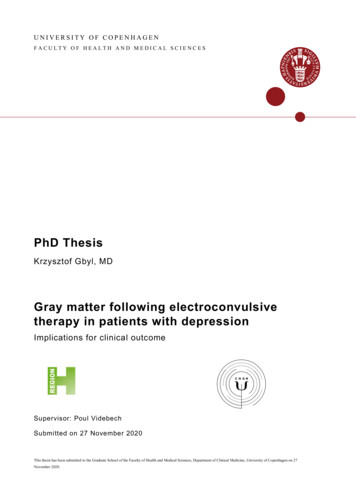
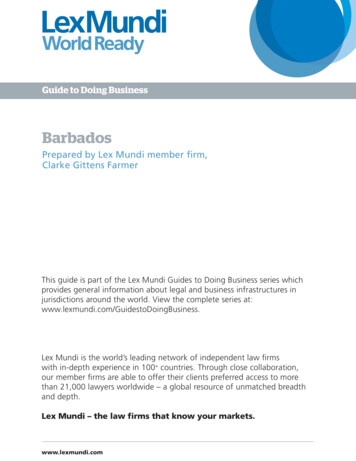
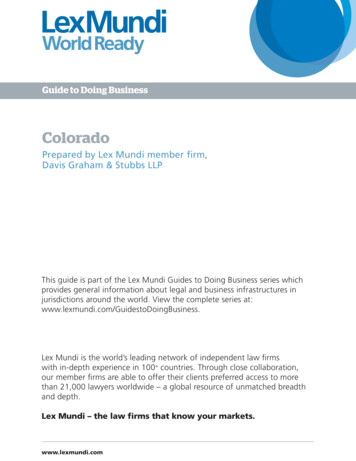
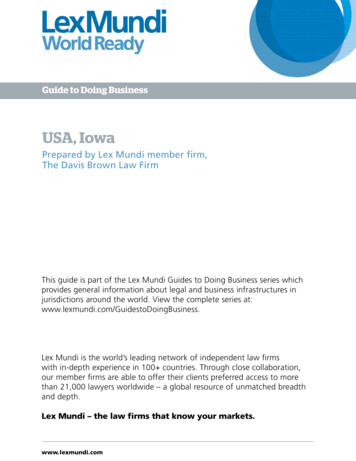
![March 3rd, 2017 [Manage Archive in Microsoft Outlook 2016]](/img/34/archive-outlook-2016.jpg)
